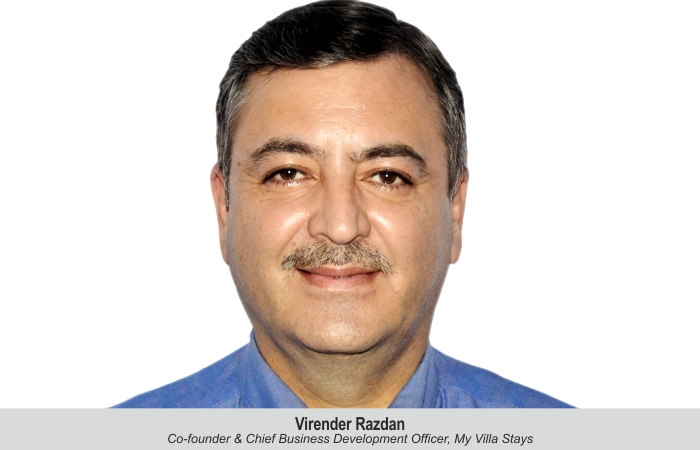Slow travel is not just a way to travel, it’s a mindset. It’s the belief that the quality of your experience is more important than the quantity of your experiences when you travel and it may have caught on in India, says VirenderRazdan, Co-founder & Chief Business Development Officer, My Villa Stays.
On 24th March 2020, the PM ordered a nationwide lockdown for 21 days that extended to over 90 daysand this changed the vacation pattern of our fellow citizens. They just wanted to move out even if it was just few hours’ drive from home. So we can say that in 2021, the Indian vacationer adapted to how Europeans have been travelling – slowly!
Slow travel is bringing us back to the roots of why we travel. People are embracing this mindset to offset travel fatigue and fully immerse themselves in experiences.Travel has become a ubiquitous part of life for so many people, particularly now that technology has made it seem much more accessible.
If you find yourself making an extensive list of the places around the country that you want to tick off your bucket list, it may be time to take a step back and think about the reason behind your desire to travel. What do you want out of your travels? A fast and furious tour seeing ‘everything there is to see’, changing locations every two to three days? Or do you want to feel like a local, spending leisurely days strolling off the beaten path? If you’re craving a more authentic experience, one that leaves you with a feeling that you truly got to know the places, people and cultures on your travels, it could be time to slow down.
What is slow travel?
Slow travel is an approach to travel that emphasises connection: to local people, cultures, food and music. It relies on the idea that a trip is meant to educate and have an emotional impact, in the present moment and for the future, while remaining sustainable not just for the local communities but also for the environment.
Heard of the slow food movement? It originated in Italy in 1986 and aimed to preserve regional cuisine, local farming and traditional cooking methods through education of tourists and local residents. People were realizing that increased tourism was changing the way people were eating, bringing larger, chain-based restaurants to major cities and taking away profits from family-owned establishments. The slow food movement worked to draw business back to traditional restaurants by touting the benefits of using regionally-sourced ingredients and stimulating local economies. Different industry, same concept. When it comes to travel, a “slow” mindset urges tourists to take a step back from their to-do lists and Instagram-worthy photo ops and simply embrace what the local community has to offer. Instead of making sure you hit the “hot spots” outlined in a travel guide, focus on things that locals do every day, things that excite them and give them joy. The impact that these connections have on you will last a lot longer than the memories that you have of racing from one tourist attraction to another.
Slow travel is not just a way to travel, it’s a mindset. It’s the outlook that the quality of your experience is more important than the quantity of your experiences when you travel.You can wake up without plans for the day, unsure of the adventures that await you, but with the knowledge what you will experience, will mean so much more than a post on social media could convey. Many travellers like to use the phrase ‘there’s always another trip’ to convey that it’s impossible to see or do everything within a city in a short span of time. It’s okay to save some of the sights for another visit. Instead of racing to do it all, indulge in experience-based activities.What other impactful local activities could you only experience if you were traveling slowly?
 TravTalk India Online Magazine
TravTalk India Online Magazine








